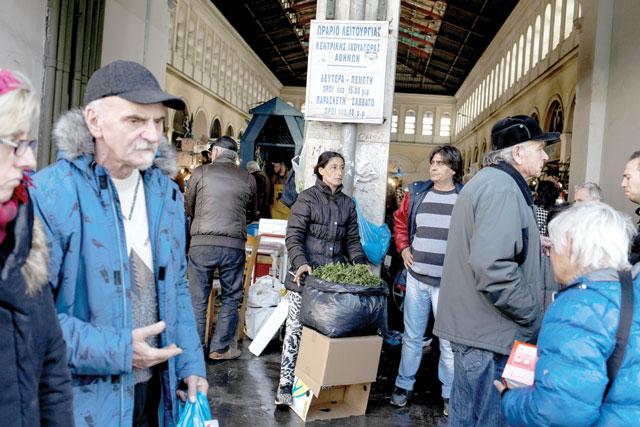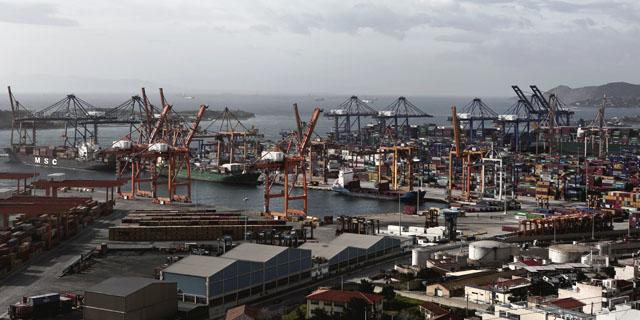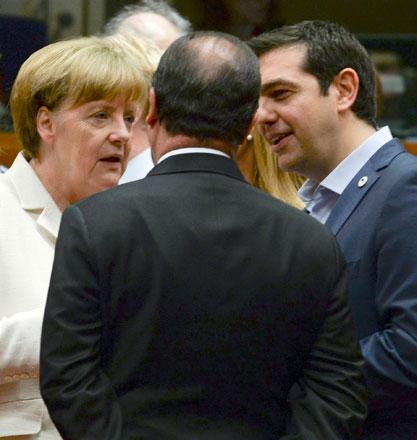You are here
Greece compromises on bailout reforms — officials
By AFP - Feb 20,2017 - Last updated at Feb 20,2017

People make their way outside the main fish market in Athens, Greece, on Saturday (Reuters photo)
BRUSSELS — Greece on Monday agreed to compromise on new bailout reforms in a bid to break a deadlock with its EU- International Monetary Fund (IMF) creditors that has sparked fears of a new Grexit crisis.
Officials representing the lenders will return to Athens shortly for talks on new measures, Eurogroup chief Jeroen Dijssebloem said after talks in Brussels.
Austerity-hit Greece's eurozone and the IMF lenders have been locked for months in a standoff over debt relief and budget targets.
"I'm very happy with that outcome today," Dijsselbloem, the Dutchman who heads the Eurogroup of 19 eurozone finance ministers, told a press conference.
"They will work with the Greek authorities on an additional package of structural reforms of the tax system, pension system and labour market regulation."
Creditor officials left Athens in December after failing to sign off on the second review of Greece's bailout and freeing up new funds.
Dijsselbloem said they will now return "in the very short term".
Markets have been spooked by fears of a return of the "Grexit" crisis, with Athens at risk of default this summer if it cannot unlock the latest tranche of the huge 86-billion-euro ($91 billion) bailout agreed in 2015.
Fears are that a long series of elections, starting with the Netherlands in March and France in April, could delay matters dangerously.
'Not one euro more'
Greek Finance Minister Euclid Tsakalotos approved measures that will be automatically triggered if Athens fails to meet budget targets, European sources told AFP.
"The Greek side agrees to legislate the reforms which will take effect from 2019," a Greek government source said on condition of anonymity.
But the deal will include an "inviolable" clause that there will not be "one single euro more of austerity", the Greek source said.
The measures must still be approved by the Greek parliament, most likely in mid-March, a step that has caused problems in previous deals.
Germany's powerful Finance Minister Wolfgang Schaeuble said he was confident the IMF would continue to participate in the bailout.
"I am working on the principle that the [creditor] institutions now have a common position," Schaeuble said ahead of the meeting,.
German Chancellor Angela Merkel meets International Monetary Fund chief Christine Lagarde and European Commission head Jean-Claude Juncker in Berlin on Wednesday, in hopes of making further progress.
The Europeans have been at loggerheads with the IMF over the Washington-based lender's demands for easier budget targets and for Athens' mountain of debt to be reduced.
The IMF insists that budget targets demanded of Greece by the Europeans are too ambitious.
But if the eurozone is going to stick with its plans, then the IMF has demanded what it sees as the necessary tax hikes and pension cuts to meet them before it will lend further to Athens.
Greece, led by leftist premier Alexis Tsipras, refuses the further tightening of the screws, calling it an unfair addition to what he has already delivered.
Meanwhile, eurozone hardliners led by Schaeuble refuse to back down on the IMF's call for debt relief, while insisting at the same time that the IMF stay on board with the bailout.
"It's a very tough negotiation," said a negotiator on condition of anonymity.
Difficult elections
The stakes could hardly be higher as the last such crisis, which followed Tsipras's election, nearly saw Athens expelled from the euro.
A possible default by Athens is still some months off but it needs enough money to repay seven billion euros in debt in July.
The elections in Europe are adding to the pressure, with Dijssebloem himself at risk of losing his job if the polls are right about his party's position.
Anti-EU candidates are leading polls in those elections and officials worry that Greece's future could get ensnared in the campaigning.
Delays in the talks have worried already jittery markets.
Greece's two-year borrowing rates have risen as high as 10 per cent in recent weeks while France has also come under some pressure as investors seek safety in German assets.
Related Articles
FRANKFURT () — Eurozone ministers approved the launch of Greece bailout talks and the European Central Bank (ECB) boosted its cash lifeline
German politicians kept up the pressure on Greece over the weekend to implement reforms, with Economy Minister Sigmar Gabriel warning Athens in an interview that a third aid package would not be on the cards unless the Greeks made some changes.
BRUSSELS — Eurozone leaders told near-bankrupt Greece at an emergency summit on Sunday that it must enact key reforms this week to restore t


















